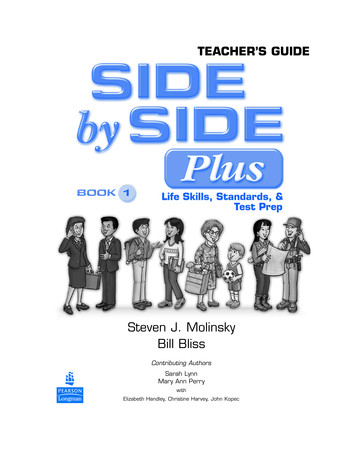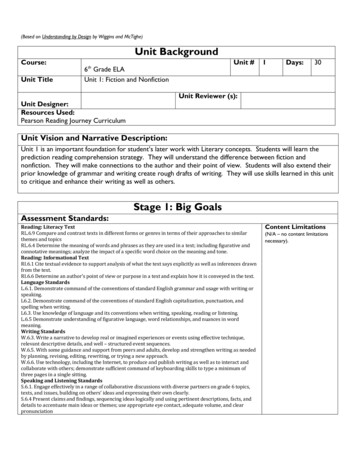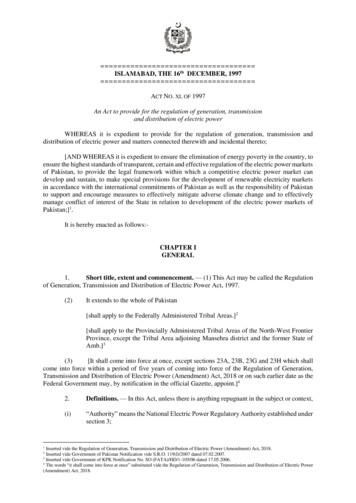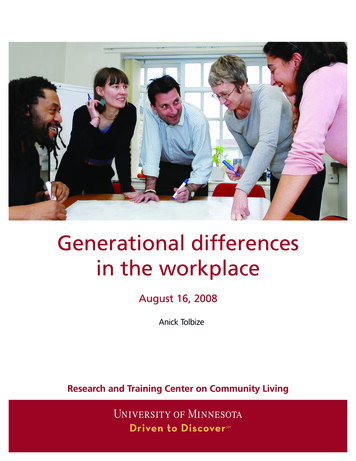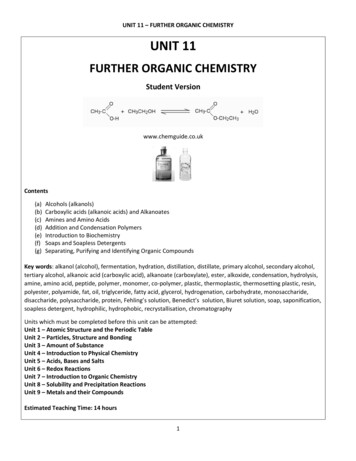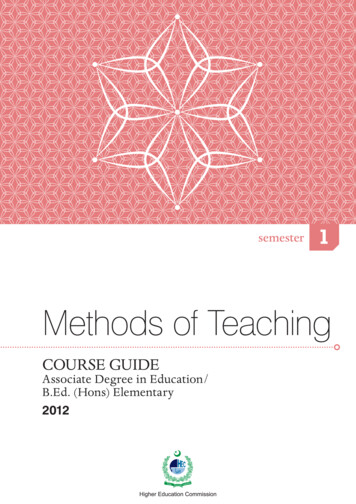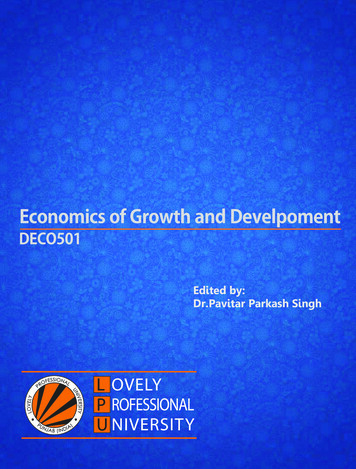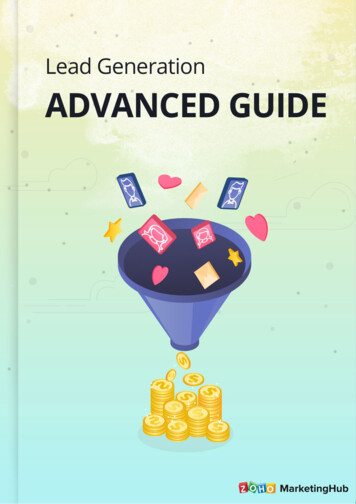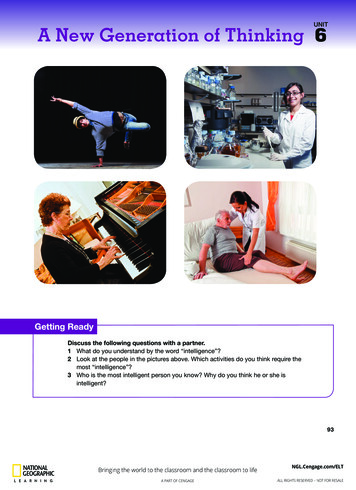
Transcription
UNITA New Generation of Thinking 6Getting ReadyDiscuss the following questions with a partner.1 What do you understand by the word “intelligence”?2 Look at the people in the pictures above. Which activities do you think require themost “intelligence”?3 Who is the most intelligent person you know? Why do you think he or she isintelligent?9308096 ch06 ptg03 093-106.indd 9311/28/13 7:38 PM
UNIT 6Before You ReadWhat’s Your EQ?Chapter 1ASkimmingAnswer the following questions.12Do you know what an IQ test is? What does it measure?EQ refers to “Emotional Intelligence Quotient.” What do you think thismeans?3 Which do you think is more important: a high EQ or a high IQ?BReading SkillEmotional IntelligenceDiscuss your answers with a partner.A Skim the passage on the next two pages, and look at the pictures andcaptions. Then complete the following sentences.1The book Emotional Intelligence is about.a how success is determined more by emotional stability than IQb why some people are better at sensing emotions compared to othersc how intelligence can be measured by how happy or sad peoplegenerally are2 The Marshmallow Challenge was about.a how many marshmallows the children could eatb whether the children were able to count the marshmallowsc whether the children could resist eating marshmallows3 The word amygdala refers to.a memories that are unpleasant or cause stressb the part of the brain that controls emotionsc a condition that affects people with emotional issues4 The author Daniel Goleman believes that.a emotional intelligence is best taught to children and teenagersb a person is born with a fixed amount of emotional intelligencec one can develop their emotional intelligence all through lifeSkimming for contentis a useful skill thatcan help you readand comprehendfaster. You can geta good idea of thecontent of a passagewithout reading everyword or sentence. Byskimming quickly overthe text, you can pickup on the main pointsof the passage, aswell as the main ideaof what the reading isabout.BDiscuss your answers in A with a partner. Then read the passage tocheck your answers.CNow read the entire passage again carefully. Then answer thequestions on page 97.Motivational Tip: Understanding why a reading skill is important. In thischapter we have practiced skimming. What do you already know about skimming? How do you think that thisreading skill can help you become a better reader? Discuss your ideas together as a class. Identify specific waysthat you can use this reading skill beyond this particular unit.94UNIT 6Chapter 1
Emotional Intelligence510Daniel Goleman is discussing his famous “impulsecontrol” test at a San Francisco lecture and has theentire audience’s attention. Goleman, a psychologist andscience writer, is the author of the best-seller EmotionalIntelligence, a fascinating book about recent discoveriesin brain research that prove emotional stability is moreimportant than IQ in determining an individual’s successin life. One of the highlights of the book, Goleman explainsto his audience of foundation leaders, educators, andgrants donors, is a test administered 30 years ago thatGoleman calls “The Marshmallow Challenge.”In this experiment, four-year-old children were individually called into aroom at Stanford University during the 1960s. There, a kind man gave a marshmallow to each of them and said they could eat the marshmallowright away, or wait for him to come back from an errand,1 at which point theywould get two marshmallows.Goleman gets everyone laughing as he describes watching a film of the preschoolers while they waited for the nice man to come back. Some of themcovered their eyes or rested their heads on their arms so they wouldn’t haveto look at the marshmallow, or played games or sang to keep their thoughtsoff the single marshmallow and waited for the promised double prize.Others—about a third of the group—simply watched the man leave and atethe marshmallow within seconds.Daniel Goleman, best-sellingauthor of the book EmotionalIntelligence, frequently giveslectures on leadership.What is surprising about this test, claims Goleman, is its diagnostic2 power:A dozen years later the same children were tracked down as adolescentsand tested again. “The emotional and social difference between the grab-themarshmallow preschoolers and their gratification3-delaying peers was dramatic,” Goleman says.3035152025The ones who had resisted eating the marshmallow were clearly moresocially competent than the others. “They were less likely to go to pieces,freeze or regress under stress, or become rattled4 and disorganized whenpressured; they embraced challenges and pursued them instead of givingup, even in the face of difficulties; they were self-reliant and confident, trustworthy and dependable.”The third or so who grabbed the marshmallow were “more likelyto be seen as shying away from social contacts, to be stubborn andindecisive, to be easily upset by frustrations, to think of themselvesas unworthy, to become immobilized5 by stress, to be mistrustfulor prone to jealousy, or to overreact to certain situations with asharp temper.”A group of four-year-old childrenwere given the choice to eat onemarshmallow, or wait for a while inorder to receive two.1 Anerrand is a short trip taken to do a specific task, e.g. mailing letters.diagnosis is an investigation or analysis of the cause or nature of a condition or problem.3 Gratification refers to a sense of pleasure and satisfaction.4 If you say something rattles you, it upsets you.5 Something that is immobilized is unable to move or progress.2AEmotional Intelligence95
404550And all because of a single marshmallow? In fact, Golemanexplains, it’s all because of a lone neuron6 in the brain, onlyrecently discovered, that bypasses the neocortex—the area ofthe brain where rational decisions are made—and goes straightto the amygdala, or emotional center of the brain. It is here thatquicker, more primitive “fight or flight”7 responses occur, and arestored for future use. The more that emotional memories involvingtemper, frustration, anxiety, depression, impulse, and fear pileup in early adolescence, the more the amygdala can “hijack8 therest of the brain,” Goleman says, “by flooding it with strong and inappropriate emotions, causing us to wonder later, ‘Why did Ioverreact?’”amygdalaBut if the emotions stored in the brain are those of restraint, self- awareness, self-regulation,self-motivation, empathy, hope, and optimism, then we become endowed with an “emotionalintelligence” that serves rather than enslaves us for the rest of our lives.556065The bad news, says Goleman, is that a widely praised but disturbing study from the University ofVermont has shown a “decline in emotional aptitude9 among children across the board.” Rich orpoor, East Coast or West Coast, inner city or suburb, children today are more vulnerable than ever toanger, depression, anxiety—what he calls a massive “emotional malaise.10” The good news, however,involves another recent discovery—that the amygdala takes a long time to mature, around 15 or16 years, which means to Goleman that “emotional intelligence can be taught, not only in the homebut perhaps, more importantly, in school.”Goleman’s own story is as intriguing as his book. The author or co-author of nearly a dozen otherbooks involving brain research and behavior, he experienced steady but modest sales until EmotionalIntelligence hit the stores. Later came the cover of Time magazine and appearances on t elevision,such as the Oprah Winfrey Show.“But I think the book also points out the real strength in what has been a feminine preserve in thisculture,” claims Goleman. “Girls are raised to be emotionally astute and perceptive, but sons learnlittle about emotions except how to control anger. Women are absolutely more empathic than men onaverage, but they’ve felt powerless to bring up the idea of emotions as a serious topic.”70The irony, Goleman feels, is that if he had written a book about women and emotions, school reform, emotion-based leadership in business, or child psychology, “the book wouldn’t have gotten muchattention. As it happens this is a book about all those things, but women and children and school reform are marginalized11 in this society. So I come along with a lot of scientific data that says, ‘Hey,this stuff is consequential’12; and maybe some doors are opening in our society.”6Aneuron is a nerve cell.fight or flight response is a term in psychology used to describe reaction to stress causing one to either beaggressive or to run away.8 To hijack something is to take or seize control of it.9 Aptitude is the talent or ability to do something.10 Malaise is an old French word referring to the general feeling of uneasiness or discomfort.11 To be marginalized is to be placed in a position of low power or influence, or to be made to feel unimportant.12 Something that is consequential has significant consequences or impact.7 The 96UNIT 6Chapter 1
AAnswer the following questions using information from the passage.1 Why is the Marshmallow Challenge considered such a significant study?ReadingComprehensionCheck Your Understanding2List two differences that Goleman found between the children who atethe marshmallow and those who waited.3What was the “bad news” found by the University of Vermont study?4According to Goleman, what advantage do women have over men?BRead the following sentences. Check ( ) whether they are true (T) orfalse (F). If the sentence is false, change it to make it true.TF1 Goleman’s experiments were conducted onteenagers who were tested again as adults.2 Two-thirds of the children ate the marshmallowwhen the tester left the room.3 The amygdala “hijacks” the rest of the brain when aperson is angry or frustrated.4 The amygdala reaches maturity when people are intheir 50s.5 Goleman feels boys and girls are raised differently.6 Goleman thinks a book about women and childpsychology would have been an even biggersuccess.CDiscuss the following questions with a partner.Critical Thinking1If you were one of the children in the Marshmallow Challenge, would youhave eaten the marshmallow immediately? Why, or why not?2 How do you think emotional intelligence can be taught at home and inschool?Emotional Intelligence97
VocabularyComprehensionWords in ContextAChoose the best answers. The words in blue are from the passage.12345678910BAnswer the following questions, then discuss your answers with a partner. The words in blue are from the passage.1234567898UNIT 6Chapter 1If you are worried about someone’s stability, you are afraid that.a they may suddenly get sickb they may become upset easilyYou track down something that isto find.a hardb easySomeone who is prone to anger.a gets angry easilyb is calm and stableAn impulse buy is something that you bought.a immediately upon seeing itb after saving up for a long timeSomeone who shows restraint at an all-you-can-eat lunch would eat.a as much as possibleb until they are comfortably fullHaving empathy means you.a get frequent headachesb can understand others’ feelingsSomeone who is endowed with something has.a a natural talent or abilityb a tendency to please other people If your employer announces wage cuts that will “affect staff across theboard,” thenwill have their salary cut.a everyone in the companyb only senior members of staffA rational person usually makes decisions based on.a feelingsb logicBeing astute is an important quality for.a dog walkersb politiciansWhat kinds of jobs offer the most financial stability? Why?Do you think it is easier to track down missing people compared to50 years ago? Why, or why not?Are you prone to catching colds in winter? What can you do to preventthem?Give an example of a time when you had to show restraint.Do you think people can learn to be more empathic? Why, or why not?Do you know anyone who is endowed with a special talent? What canthey do?Do you think that people generally tend to make rational decisions, or doyou think we are guided by emotions?Do you think you’re an impulsive person? Why, or why not?
AWrite the part of speech for each word in the box below. Then write thewords next to the correct endtensiontendencypretendtender worrying or unpleasant habit or action that keeps occurringato give false appearance or make believe a feeling of worry or anxiety that makes it difficult to relaxdeal with or overcome a problem or difficultybecome greater in strength, amount, or degree an extra period of time for which something lasts or is valid cause (something) to swell by stretching it from insidehaving a soft or delicate textureComplete the following sentences using the correct form of the wordsfrom A.12345678Vocabulary SkillThe Root Word tendIn this chapteryou read the wordattention, whichcontains the roottent. This root wordcan also be writtenas tend or tens, andcomes from theLatin word tendere,meaning to stretch,move, or be pulled.This root is combinedwith prefixes andsuffixes to form manywords in English.One major reason why many people don’t like traveling in the winter isbecause they have towith bad weather conditions.Even though Laura has a(n)to put things off until thelast minute, she always gets things done in the end.The new CEO of the company hasknowledge of themarket after decades of being in the industry.The recipe instructed me to bake the chicken until it was lightly brownedand.There’s been a lot ofbetween John and Mary ever sincetheir big argument.Being pregnant with triplets caused her belly tomorethan the average woman’s.Scientists warn that droughts and floods will become more common ifwe don’tour efforts to prevent global warming.A psychopath is a person who lacks empathy and is emotionally shallow,but is able tootherwise to get what he or she wants.Emotional Intelligence99
UNIT 6Before You ReadBrain GamesChapter 2A eft Brains, Right Brains,Land Board GamesDiscuss the following questions with a partner.12How often do you play board games? Which games do you most enjoy?What is the most challenging board game you’ve played? What made itchallenging?3 What is the most fun board game you’ve played? What made it fun?BWrite the name of a different board game for each skill.SkillBoard gamea good vocabularya good memorythe ability to think aheadlots of patienceReading SkillIdentifying Main and Supporting IdeasA Read the following sentences from the passage on the next two pages.Skim the paragraphs mentioned below, then write whether each sentence is a main idea (M) or supporting idea (S).Paragraph 4Paragraphs oftenuse supportingideas to give moreinformation aboutthe main idea of aparagraph. Supportingideas usually followthe main idea.Different types ofsupporting ideasinclude examples,illustrations, facts,reasons, etc.Paragraph 6BCUNIT 6Chapter 2 hey discovered a Harvard University researcher named HowardTGardner.They began researching the field of intellectual psychology.Paragraph 7100 o Tait approached Alexander to help him examine the possibilities ofSproducing a new board game. When Tait and his friend Whit Alexander left their jobs at Microsoft,they vowed to jump at any future opportunities to work together. he two inventors identified a number of occupations that peopleTmight pursue if they are gifted in one of Gardner’s intelligences. They then broke down the findings into subject matters or areas ofinterest that those same people would be exceptionally strong in.Discuss your answers in A with a partner.Now read the entire passage carefully. Then answer the questions onpage 103.
Left Brains,Right Brains, andBoard Games152103154It’s not an easy task to do: You need to whistle the song Stayin’ Alive with enough skill foryour teammate to identify the 1970s disco hit. On your next turn, your partner draws a cluewith his eyes closed, and you have to guess what it is. You might also find yourself spellingwords backward in order to win a round. These odd challenges are part of the “whole brain”board game that tries to satisfy the world’s intellectual hunger, appropriately called Cranium.1In November 1997, personal experience led Richard Tait to consider this new type of boardgame that, unlike popular uni-skill games, incorporates a variety of talents. On vacation withhis wife and another couple, they found themselves stuck indoors one rainy afternoon anddecided to pass the time with a board game. They first played Pictionary2 and Tait and hiswife badly beat the other team. His competitors then sought revenge and quickly challengedTait and his wife to a game of Scrabble.3 Tait admits his friends were the overwhelmingvictors in the popular word game.“I felt terrible and wondered why there wasn’t a game where everyone that plays can havea chance to shine—still a competitive, fun board game, but one where everyone can showwhat they are good at,” explains Tait.When Tait and his good friend Whit Alexander left their jobs at Microsoft, they vowed tojump at any future opportunities to work together. So Tait approached Alexander to help himexamine the possibilities of producing a new boardgame. In only nine short months, the two formerMicrosoft employees conceived a unique game thatis designed to include something for everyone, andtook it to a market that had been craving somethingdifferent.5Richard Tait and Whit Alexander demonstratehow to play Cranium.Once they decided to take the proverbial plunge,4they began conducting research to further developthe concept of their “whole brain” game. The twogathered as much knowledge as they could aboutthe history of social games, comparing their findingsagainst the criteria for Cranium.20251 Inmedical terms, the cranium is the part of the skull that encloses the brain.is a board game whereby one person draws pictures to enable their teammates to guess a word or phrase.3 Scrabble is a board game played by forming words from sets of randomly chosen letters.4 To take the plunge means to decide to do something that involves some risk. To say something is proverbial refers tothe fact that it has become a proverb.2 PictionaryLeft Brains, Right Brains, and Board Games101
6 303574084595010556011651170Their conclusion was to develop a left brain/right brain game, but neither knew much aboutthe hypothesis, so they began researching the field of intellectual psychology. Tait andAlexander would soon discover a Harvard University researcher named Howard Gardnerwhose “Theory of Multiple Intelligences” postulates5 that there are eight core competencieswhere people show intelligence, such as linguistic, mathematical, interpersonal, or spatial.6“We thought it was a really rich framework to try to base the game design on, so we built upfrom Gardner’s work,” explains Alexander.The two inventors identified a number of occupations that people might pursue if they aregifted in one of Gardner’s intelligences. They then broke down the findings into subjectmatters or areas of interest that those same people would be exceptionally strong in, ensuringeach player their moment to shine.After about three months of research, Alexander and Tait realized the novelty of their approachto the board-game market. In total, they had come up with 14 different activities, each one innovative in its own right. One such example is “sculpterades.” As the name suggests, this activity requires players to sculpt clues from clay while their teammates guess what they aresculpting, bringing out the child in the most mature adults. The duo’s commitment to researchand quality design took them through ten different Cranium Clay recipes and multiple scentsbefore settling on a purple, citrus-smelling clay that boasts a long shelf life. Tait says thatcustomers often email them for more of the stuff because they like it so much.Next, they decided upon four unique groups of question cards, including “Creative Cat,”which features sculpting and drawing activities; “Data Head,” which focuses on trivia;“Word Worm,” which includes vocabulary-based questions; and “Star Performer” featuringperformance-based activities. It is the team with the best combination of these skills thateventually wins the game.Cranium avoids play dynamics that allow one groupto overwhelm another by limiting each team to onetask before passing the turn to the next player. Taitsays this is just one example of hundreds of gamedynamics they fine-tuned throughout the play tests.But, he adds, there was one constant throughout thetesting period: People were having a good time.“We originally started with a much broader vision thanCranium is the fastest-selling board gamejust a board game,” explains Tait. He says they looked atthe 1980s and how the heart was so heavily emphasized in history, selling 100,000 boxes in the firstseven months.in conjunction with good health. He thinks that thebrain is going to be the organ of focus for the newmillennium. “And we would like to be the company that’s at the forefront of providing fun thingsto do with your brain to keep it happy and healthy.” This strategy has made Cranium a standoutamong its competitors in the board-game industry, as there simply is no other game that offerssuch a large variety of activities.Today, the pair’s main challenge is building the Cranium brand name, and Tait alludes to apotential TV show as well as new Cranium products in the distant future.5 Topostulate is to assert or claim the existence or truth of something.refers to anything related to space. Someone with spatial intelligence is talented at manipulating figures andshapes in their minds.6 Spatial 102UNIT 6Chapter 2
AChoose the correct answers for the following questions.1234BWhy did Tait and Alexander create Cranium?a They hoped to become very rich.b They didn’t want to work at Microsoft anymore.c They wanted to create a game in which everyone could do well.d They wanted to compete with Pictionary and Scrabble.According to the passage, what is wrong with Pictionary and Scrabble?a They are for people who are very competitive.b They are not very fun to play.c They do not focus on keeping your brain healthy.d They are only good for people with specific intelligences.How does Cranium avoid one group overwhelming another?a Groups are allowed to choose their favorite activity.b Each team only gets one activity per turn.c It focuses on making sure players have a good time.d There are 14 different activities for teams to choose from.Which could be another title for this passage?a The Theory of Multiple Intelligencesb Famous Board Gamesc Building the Cranium Brand Named Everybody Wins at CraniumReadingComprehensionCheck Your UnderstandingWrite the Cranium game categories (mentioned in paragraph 9) next tothe correct activity.Creative Cat Data Head Word Worm Star Performer1234C he team has to answer a question about which is theTsmallest country in the world. One team member has to imitate a famous person whilethe other team members guess the person’s identity. One team member has to sketch or draw an object withhis or her eyes closed while the other team membersguess what it is. One team member has to spell a word backwards out loudwithout making a single mistake.Critical ThinkingDiscuss the following questions with a partner.1Have you come across the terms “left brain” and “right brain” before?What do you understand by them?2 Do you agree with Tait that “the brain is going to be the organ of focus ofthe new millennium”? Why, or why not?Left Brains, Right Brains, and Board Games103
VocabularyComprehensionAMatch the words in the box with the correct definitions. Write a–j. Thewords are from the passage.Definitionsa conceive b criteria c hypothesis d giftede in conjunction withf fine-tune g novelty h dynamics i allude to j forefront12345678910BComplete the following sentences using the correct form of wordsfrom A.12345678910104UNIT 6Chapter 2refer to something or someone in an indirect wayinteractions; relating to interpersonal relationshipssomething that is new and unusual or differentnaturally and exceptionally talentedthe leading or most influential position or placea theory or idea based on facts but not yet proven to form or think of somethingto improve something by making minor adjustments conditions or standard by which something can be measured orjudgedalong or together withFor many people, the most importantfor buying ahouse are the location and price.The cowboy-themed restaurant was popular at first, until thewore off and people stopped going.The company aims to be at theof mobile phonetechnology.She didn’t want to present her business plan until she had finishedit.Understanding groupand how people work with eachother is the key to successful teamwork.Communication technology is so commonplace now that most peoplecannotof a world without mobile phones or the Internet.The advertisement claims that the skin lotion should be usedthe facial wash to produce the best results.The results from the study strongly support thethatsmoking is the leading cause of lung cancer.Many universities give scholarships tostudents andtalented athletes.During the interview, the celebrityhis relationship statusbut did not give the press any details.
AStudy the following words. With a partner, write the part of speech anda simple definition for each word. Then check your answers using adictionary.WordPart ofSpeechDefinition1 accept2 intercept3 recipient4 anticipate5 captivate6 receive7 capacity8 captorBVocabulary SkillThe Root Word capIn this unit, you readthe words conceiveand concept, whichare formed using theroot word cap, alsowritten as cep, cip, orceive. This root comesfrom the Latin wordcapere, meaning totake, receive, or seize.It is combined withprefixes and suffixesto form many wordsin English.Complete the following sentences using the correct form of wordsfrom A.12345678I think the maximum seatingfor a taxi in this countryis four people.Due to the global economic downturn, I don’tthatwe will make our original sales goal.Shelly is a great designer, but sometimes her ideas are so “creative” thatthey are not alwaysby her colleagues or clients.Customs officials managed tothe goods that werebeing smuggled into the country.Anthony’s debut stage performancethe audience.Did weany mail this morning? I’m expecting aletter from the bank.The president’s daughter has been kidnapped! Herare demanding a six-million-dollar ransom.Those employees who were not theof prize moneyin the annual charity draw will receive restaurant vouchers from the CEO.Motivational Tip: Group cohesiveness. What does the word “cohesive” mean? What arethe characteristics of a cohesive group? Strengthening the cohesiveness of your class will help people enjoy thereading and learning process more. Identify one or two things that you can do as a class to improve cohesiveness.Display your ideas in the classroom to help you remember them.Left Brains, Right Brains, and Board Games105
Real Life SkillADetermining YourIntelligenceRead the following intelligence types and choose three that bestdescribe you.Verbal/Linguistic types are naturally good at writing or speaking and withmemorization. They have big vocabularies and learn new words easily.“Multiple Intelligences”is Howard Gardner’spsychological theoryabout how peoplecan possess differenttypes of intelligencesand learning styles.Many people arelikely to possess arange of intelligences.For example, anindividual may haveverbal, musical,and interpersonalintelligence.Logical/Mathematical types are driven by logic and reasoning. They canusually make calculations quickly and are good at strategy games.Visual/Spatial types are good at remembering images and are aware ofsurroundings. They tend to be good at reading maps.Bodily/Kinesthetic types tend to be active and are aware of their bodies.They enjoy sports and moving around.Musical types are musically gifted and have a “good ear” for rhythm andcomposition. They tend to play a musical instrument or sing well.Intrapersonal types are reflective and can figure out their own feelings,motivations, and goals. They prefer to work alone.Interpersonal types are good with people and do well in social interactions.They enjoy team sports and group work.Naturalist types have an appreciation for animals and the outdoors. Theytend to enjoy hiking and gardening.BDiscuss your choices in A with a partner. Then answer the followingquestions.12CDo you think knowing the type of intelligence you possess can help withlanguage learning? How so?What careers would best suit each of the intelligence types? Giveexamples using your three choices.Do a search on the Internet using the key words “multiple intelligencesquiz.” Take one of the quizzes to identify which are your strongestintelligences.What do you think?1 Why do you think this unit is called “A New Generation of Thinking”? How does itdiffer from the old way of thinking?2 Does your country or society encourage this new way of thinking? Does youreducation system benefit people with different types of intelligences? Why, orwhy not?3 How can you develop the intelligences that you are weak at? Suggest someactivities.106UNIT 6Chapter 2
Emotional Intelligence 95 1 An errand is a short trip taken to do a specific task, e.g. mailing letters. 2 A diagnosis is an investigation or analysis of the cause or nature of a condition or problem. 3 Gratification refers to a sense of pleasure and satisfaction. 4 If you say something rattles you, it upsets you. 5 Something that is immobilized is unable to move or progress.
